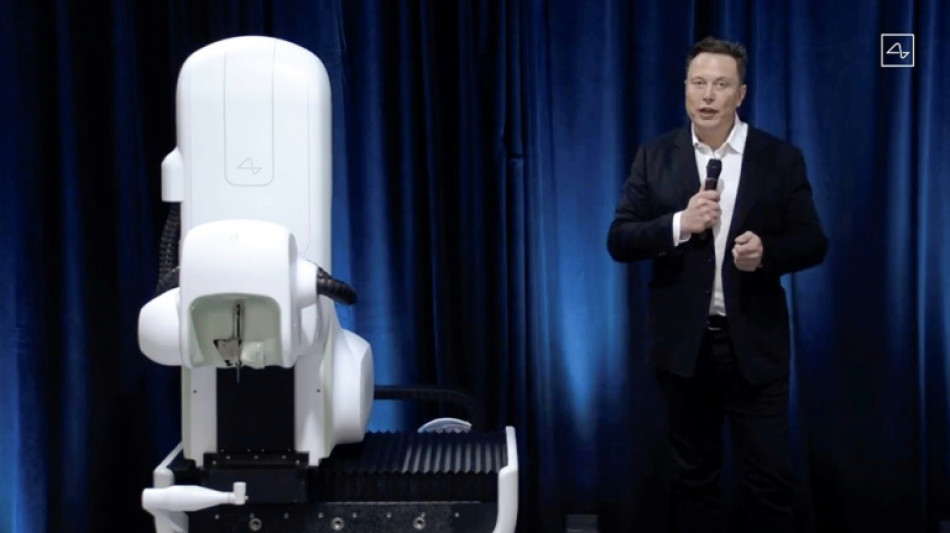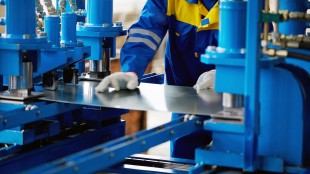
-
 'Two-pope' Catholic Jubilee draws 33 million pilgrims to Rome
'Two-pope' Catholic Jubilee draws 33 million pilgrims to Rome
-
Three hurt in polar bear attack in remote Siberian village

-
 Virtual museum preserves Sudan's plundered heritage
Virtual museum preserves Sudan's plundered heritage
-
Dakar bike champion Sanders wins second stage to take lead

-
 Maduro arrives for first US court appearance after capture
Maduro arrives for first US court appearance after capture
-
How Ruben Amorim's Man Utd reign turned sour

-
 Xi urges South Korea's Lee to make 'right choices' in turbulent world
Xi urges South Korea's Lee to make 'right choices' in turbulent world
-
Medvedev renews call for early nights at Australian Open

-
 EU says 'seriously looking' into Musk's Grok AI over sexual deepfakes of minors
EU says 'seriously looking' into Musk's Grok AI over sexual deepfakes of minors
-
German renewable energy shift slowed in 2025

-
 Medvedev in great touch as he starts 2026 with Brisbane cruise
Medvedev in great touch as he starts 2026 with Brisbane cruise
-
French court jails one in Brigitte Macron cyber-bullying trial

-
 Oil prices ease as investors track Venezuela fallout
Oil prices ease as investors track Venezuela fallout
-
Patient killed in Russian strike on Kyiv clinic

-
 Myanmar pro-military party wins first phase of junta-run election: official results
Myanmar pro-military party wins first phase of junta-run election: official results
-
Double Olympic champion Chebet takes maternity break in 2026

-
 Amorim sacked by Man Utd after 14-month reign
Amorim sacked by Man Utd after 14-month reign
-
Maduro due for first US court hearing after capture

-
 Manchester United sack manager Ruben Amorim
Manchester United sack manager Ruben Amorim
-
Bangladesh says at least 287 killed during Hasina-era abductions

-
 South Korea's Lee meets Xi with trade, Pyongyang on the agenda
South Korea's Lee meets Xi with trade, Pyongyang on the agenda
-
Gauff shocked in United Cup, comeback kid Hurkacz stuns Zverev

-
 Tech firms lead markets higher, oil swings after Maduro ouster
Tech firms lead markets higher, oil swings after Maduro ouster
-
Defending Brisbane champion Lehecka wins tough opener

-
 Maduro's fall tests Venezuela's ruling 'club'
Maduro's fall tests Venezuela's ruling 'club'
-
'I can't walk anymore': Afghans freeze to death on route to Iran

-
 UK starts ban on junk food ads on daytime TV and online
UK starts ban on junk food ads on daytime TV and online
-
Trump declares US 'in charge' of Venezuela and Maduro goes to court

-
 Two killed in series of Russian attacks on Ukraine
Two killed in series of Russian attacks on Ukraine
-
Kasatkina feels pressure to 'repay Australia' after Russia switch

-
 Suns stun NBA-best Thunder as East-leading Pistons top Cavs
Suns stun NBA-best Thunder as East-leading Pistons top Cavs
-
China's birth-rate push sputters as couples stay child-free

-
 'Not about condoms': Chinese shrug off contraceptive tax
'Not about condoms': Chinese shrug off contraceptive tax
-
Root's majestic 160 powers England to 384 in final Ashes Test

-
 Chalamet boosts Oscar bid with Critics Choice Awards win
Chalamet boosts Oscar bid with Critics Choice Awards win
-
'Tuna King' pays record $3.2 mn for bluefin at Tokyo auction

-
 Tech firms lead Asian markets higher, oil swings after Maduro ouster
Tech firms lead Asian markets higher, oil swings after Maduro ouster
-
Cricket Australia boss hits out at 'archaic' bad light rules

-
 Trump insists 'we need Greenland'
Trump insists 'we need Greenland'
-
Century-maker Root steers England to 336-6 in final Ashes Test

-
 'Free our president', Maduro supporters demand at rally
'Free our president', Maduro supporters demand at rally
-
Danish PM calls on US to stop 'threatening' Greenland

-
 North Korea tests hypersonic missiles, says nuclear forces ready for war
North Korea tests hypersonic missiles, says nuclear forces ready for war
-
Root in Ponting territory with 41st Test century at 5th Ashes Test

-
 Charlie's Holdings (OTCQB:CHUC) Signs Agreement with IKE Tech to Commercialize Transformational Age-Gated Vapes that Will Address FDA Concerns Related to Youth Access
Charlie's Holdings (OTCQB:CHUC) Signs Agreement with IKE Tech to Commercialize Transformational Age-Gated Vapes that Will Address FDA Concerns Related to Youth Access
-
Nextech3D.ai Closes Krafty Labs Acquisition Expanding into a Comprehensive End-to-End AI-Powered Live Events and Experiential Engagement Platform

-
 From Full-size to Mini, the Epomaker TH Series Offers a Versatile Range of Keyboards
From Full-size to Mini, the Epomaker TH Series Offers a Versatile Range of Keyboards
-
Patterson-UTI Reports Drilling Activity for December 2025

-
 Wrk Receipts Launches Game-Changing Update as Workers Demand New Tools to Navigate Today's Workplace Challenges
Wrk Receipts Launches Game-Changing Update as Workers Demand New Tools to Navigate Today's Workplace Challenges
-
Fortitude Gold Receives Scarlet South Mine Permits


Musk's superhuman vision promise is dangerous: researchers
Researchers have criticised billionaire Elon Musk for promising that his brain implant technology could eventually provide patients with vision superior to normal human sight.
Musk has long promised that his Neuralink company was working on implants that could restore sight to blind people, telling his 190 million followers on X in March that the product would be called "Blindsight".
He said the product was already working in monkeys, adding: "Resolution will be low at first, like early Nintendo graphics, but ultimately may exceed normal human vision."
But Ione Fine, psychology professor at the University of Washington, said it was "a dangerous thing to say".
Fine co-authored a paper published Monday in the journal Scientific Reports that used models known as "virtual patients" to simulate how such implants could work.
The article argues that the impact of novel implants including Musk's are likely to be limited by human biology.
Fine said Musk's idea rested on a flawed premise that high-resolution vision could be created by implanting millions of tiny electrodes into the visual cortex, the region of the brain that processes information received from the eye.
"Engineers often think of electrodes as producing pixels, but that is simply not how biology works," she said in a statement.
Creating an image in the brain involves not only stimulating individual cells in the way an implant can do, but also then generating a "neural code" that fires across thousands of cells.
She said scientists were not even close to finding the correct neural code in a blind person -- meaning the impact of implants would be limited.
"Blindness doesn't make people vulnerable, but becoming blind late in life can make some people vulnerable," she said.
"So, when Elon Musk says things like 'this is going to better than human vision', that is a dangerous thing to say."
A.Mahlangu--AMWN
